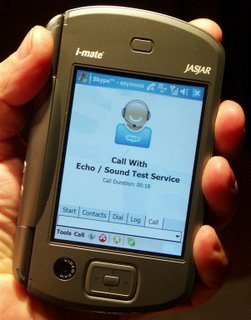Skype At Large

It has been two weeks since the Teleputer landed in Kraków. I must admit I have not had much time to explore all of its features and conduct many in depth tests. On the other hand I've been using the JasJar just as an ordinary user. Checking and writing my emails, browsing the Web and playing some games. Speaking of games - judging by the popularity of the device among my family members, the Bubble Breaker itself (the one that comes with Windows Mobile 5) may justify the decision to purchase the Teleputer :)
As I wrote before, the JasJar comes with Skype Internet telephony client preloaded. I tried to play with Skype as soon as I configured the device, but the application simply would not run. Two things changed, however, over the weekend. First, I noticed there is a new firmware version posted on the i-Mate site. After downloading and installing the update, I was able to start Skype, but I simply did not have time to test it. Today I have noticed, Skype presented a new version of the Pocket PC client. So I got rid of the old one replacing it by the latest (1.2.0.89). Installation went without a glitch, and as soon as it finished, I was able to log on to my Skype account... over the UMTS (3G/WCDMA) network.
Skype over UMTS is what I was looking for when I decided to buy the JasJar. Skype over GPRS/EDGE cannot be more than a lab test, these technologies introduce too much latency to be used for VoIP in practice. Skype over WiFi works fine, but there are three problems with that. Firstly, there is no universal WiFi coverage, so while you can use this at home or at work, you won't be able to use it just anywhere. The hotspots are just that - spots, so when you move out, you loose your connection. Secondly, WiFi drains your batteries. This is just build in the standard. WiFi is good for laptops, but the power levels and communications patterns will drain any phone battery fast. Thirdly, the WiFi interface cannot hold the session when the device goes into a suspend mode. So waking it up takes longer. UMTS on the other hand is working and keeps the data connection alive even if the Teleputer is suspended. So waking up Skype is almost instant, because 3G data connection is already there. And speaking of power consumption - it is very good. For tests I've been keeping the device on all the time with UMTS connection active for 8 hours now (with the screen on, only backlit off), doing some calls in the meantime, and it has drained roughly 40% of the battery. That means, you will be able to be on-line for the entire day.
The voice quality is very good. The JasJar has relatively fast processor (520MHz) and that gives just enough computing power for Skype VoIP encoders and echo cancellation algorithms to do their job. UMTS data throughput and - what is more important - relatively low packet latency allow you to use Skype to conduct ordinary calls. For tests I've been using headphones. Skype has yet to figure out different configurations of the JasJar, as the current version uses only the main speakers (or wired headphones). I was not able to redirect the output to the built-in earphone or Bluetooth headset. But this is something you can forgive, as this is a beta version at the moment and I hope they will provide ways to use different audio setups.
Overall I must say the JasJar with Skype is almost perfect solution (especially due to on-board UMTS link). It is a harbinger of things to come in the near future. Soon, when most of the phones are powered by the chips like the Scorpion, recently announced by Qualcomm, smart teleputers equipped with mobile VoIP in form of Skype (or may be Google Talk?) will rule the new world built on the ruins of today's telecoms, connecting over any [dumb] network.
Good try. I think if skype use standard protocol like SIP, it'll be much easy for hardware manufacture to make devices that can work with it.
ReplyDeleteYou are right. SIP is the standard. But Skype has its community we can't ignore. And SIP is just signalling, I am sure once Skype opens their signalling, there will be gateways so you'll be able to dial Skype user from your SIP phone. What is even more interesting is codecs. Skype and othe popular internet telephony platforms (including Google Talk) use Glopal IP Sound (GIPS). The question is will GIPS prevail?
ReplyDelete